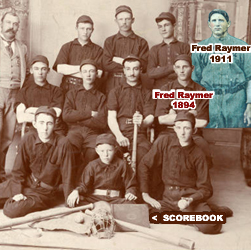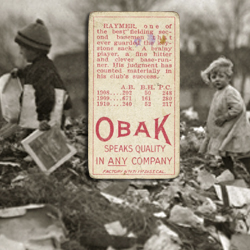Approximately two years have passed since the first time I read his name as part of my ongoing research into the origins of baseball in Albuquerque, New Mexico. When I “discovered” that Fred had a couple of baseball cards about a week later, I made a mental note to make an attempt to pick one up if I ever had an opportunity. Further research is needed to determine whether Raymer was the first professional Albuquerque ballplayer to end up on a baseball card (one of my research questions). I will be shocked it that turns out to be the case, but for now, he’s at the head of the class.
Today marks the 133rd anniversary (November 12, 1875) of Frederick Charles Raymer’s birth in Leavenworth, Kansas. If Fred were alive today, I would be honored to help him extinguish the blaze resulting from 133 candles that would be ignited on the top of his birthday cake- ideally, before it became visible to scientists living in the International Space Station. Afterwards, I would ask him so many questions about baseball that he may begin to regret the game’s very existence.
What? You don’t know who Fred Raymer was? Consider for a moment that Fred’s career major league baseball offensive stats include 301 hits, 95 runs and 101 RBIs with a .218 batting average over parts of three seasons with the Chicago Orphans and Boston Beaneaters more than a century ago. Unimpressed? Raymer also swiped exactly 50 bases without being caught once, and also never grounded into a double play. Granted, those stats aren’t going to result in Raymer’s descendants receiving a key to Cooperstown, but neither can Fred be summarily dismissed as a potential candidate for inclusion in the Albuquerque Professional Baseball Hall of Fame simply because no one has really has a handle on who some of these early players were.
This particular baseball card was issued in 1911; some six years after Raymer’s stint in the major leagues, and a whopping seventeen years after he played ball professionally in Albuquerque. Having survived two world wars, the great depression, lord only knows how many spring cleaning and garage sale “near misses,” tradings and everything else time has subjected it to, this fascinating baseball card was destined to occupy a prime spot in my collection. I acquired this tiny piece of history last week from a collector in Alaska in exchange for the proceeds from a two-dollar win-place-show ticket on “El Becerro”- the nine horse in the 400-yard 5th race of the day at the Downs at Albuquerque on November 2nd.
Numbered 420, Fred Raymer’s baseball card is one of the final offerings in the three-set run of some 426 minor league “T212” baseball cards issued by OBAK Cigarettes (an American Tobacco Company product) between 1909 and 1911. In those days, collectors were willing to sacrifice a lung (sometimes two) in order to build an entire set of these stellar baseball cards. That, my blog reading friends, is dedication! Of course card collecting was simpler back then since there were no sequentially numbered superfractors, parallel inserts or game-used nicotine patch cards to distract and confuse collectors.
The Victoria Bees were one of six teams from the Class B Northwestern League that were featured alongside players from Pacific Coast League teams in the OBAK T212 “Type 3” subset that was released in 1911. These teams included professional ball clubs located in Spokane, Tacoma, Vancouver, Los Angeles, Oakland, Portland, Sacramento, San Francisco, Vernon, Portland and Seattle. The few reports I’ve managed to uncover suggest the 1911 Bees were wildly popular among fans living in Victoria, British Columbia in spite of their dismal record of 41-125. Of course with a record that lopsided, a stretch is hardly necessary to imagine that the Raymer and his fellow Beemates, including Ten Million, were welcomed with open arms by fans of opposing teams wherever they played.
I’ve modified this photo of the 1894 Albuquerque Browns Base Ball Club to show the ghost of “Raymer future” standing over the shoulder of his younger self- because I can. Fred was only 19 years old when he played short stop for the Albuquerque Browns. He was also employed at that time as a fireman for the Atlantic & Pacific Railway. Fred Raymer reminds me of Josh Wilson.
Another item that I feel the need to point out in this image is the scorebook. When I begin to think about the possibility that such an interesting artifact may have survived into modern times, I become a little dizzy.
My historical baseball research has included spending countless hours at the Albuquerque Public Library reviewing reel upon reel of microfilmed historic newspapers, capturing digital images of any and all mentionings of “base ball” and subsequently transcribing those old newspaper articles into Word documents and Excel spreadsheets. I’m recording box scores, game write-ups, and even intra-territorial “smack” and challenges issued between the various ball clubs and other interested parties- all while compiling rosters for the home team as well as their worthy opponents.
I don’t think I can adequately describe the warm feeling of discovery that comes with reading copies of 120-year-old newspapers and piecing together the history of a baseball team’s forgotten past one day at a time. The baseball reporting enough makes the project more than interesting, and then there are all of the other items (that I refer to as “distractions”) such as ads for bizarre household and personal items, obituaries, police and court reportings, accounts of fairs, carnivals and pie baking contests to either ignore or digest. It is an incredible method of discovering the history of a city. I guess my point is that one could find less interesting ways to spend the winter…
Fred Raymer also has a card in the 1910 OBAK set that I would love to add to my collection. The few I’ve seen for sale have been graded, slabbed and ultimately priced completely out of my price range. That’s okay though, because I have the patience of an archaeologist, which is more than enough to allow me to wait for a well-used specimen in need of a caring home to blip on my radar. I would enjoy nothing more than to manage to complete a trade for that one!
Fred Raymer passed away in Los Angeles on June 11, 1957. I wonder if anyone ever asked Fred to autograph one of his cards.
A quick word about the background image I’m using to frame the back of this kool relic. As I’ve mentioned in previous posts, Shorpy is an amazing resource for intriguing photographs, such as this one. It is a great site to visit if you want to kill a LOT of time, or if you are simply in need of inspiration to modify your current perspective.
Let’s see… Lewis Wickes Hine took this photo in November of 1912 at the Whitman Street dump. For those unfamiliar with the history of Pawtucket, Rhode Island, the Whitman Street dump is likely where a number of unwanted cigarette era baseball cards ended up. Just think of it, these gems were probably often casually cast aside in the same manner that grocery store ads that appear in our mailboxes each week are treated. I guess what I’m wondering is how many of these cards did these young scalawags find, if any, while poking around in that dump and others just like it. Do you suppose either of them collected cigarette cards?
Finally, I created a couple of greeting cards featuring variations of the images used in this blog entry over at Zazzle.com- you know, to send out for the upcoming holidays, birthdays and to include in random mailings as needed. These same cards are also available to you if you find that you like the concept, but run short on the time needed to create your own (which I highly recommend). You can even personalize these note cards in case you want to use them to pimp your blog, website, or upcoming card show. In the interest of full disclosure, ten percent of the purchase price (but none of the shipping) is paid to the Aardvark Trading Company (friendly folks!).
The first features the ominous greyscale background that you had to have seen near the top this post. The second offering is for people desiring full color. What about stickers? Okay… but that’s it!
– Kris
Tags: Albuquerque, baseball cards, cigarette cards, historic baseball cards, Northwestern League, OBAK



Leave a comment